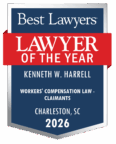
Back injuries are one of the most common job-related ailments. According to the Bureau of Labor Statistics, more than 128,000 workers suffered back injuries severe enough to require time off work in a recent year. These injured workers often faced significant medical expenses and time off work, with serious consequences to the workers and their families.
Many of the injuries could have been prevented if the worker and their employer had followed certain safety tips.
Below, the South Carolina workplace accident lawyers of Joye Law Firm Injury Lawyers explain some of the common causes of on-the-job back pain, how to avoid injury, and what to do when you sustain a back injury. Contact us if you’ve suffered a workplace back injury and need help seeking workers’ compensation benefits.
Causes of Backlawyer/Spinal-Cord-Injury/Back Pain in the Workplace
Workers in certain occupations involving heavy physical labor such as construction workers, agricultural workers, warehouse workers, nurses, nursing home staff, and auto mechanics are at increased risk of back injuries. But anyone can hurt their back at work. Lower back injuries are the most common type of back injuries.
A few of the most common causes of work-related back injuries are:
- Lifting/moving heavy objects – Lifting and carrying heavy objects puts a lot of strain on the muscles, vertebrae, and other parts of the back. If a worker does not use proper lifting techniques, the pressure can cause muscle strains, tears, or a herniated disc. When possible, use machinery to lift heavy objects and prevent strain on your back.
- Repetitive stress/motion – Not all back injuries are caused by a single incident. In many cases, a back injury at work is the result of cumulative stress over time from repeating the same motion. Back injuries due to repetitive stress are more likely for workers whose jobs require them to twist or rotate their upper body. Using a support belt or harness can minimize strain on the back and prevent injury.
- Improper training/lack of safety education – Many people don’t use proper lifting techniques when moving heavy objects. Employers can help prevent back injuries by providing training about how to lift items safely.
- Falling objects – Any large object can cause significant injuries if the object strikes a worker’s back. If a heavy object strikes a worker’s spinal column, it can crack vertebrae or damage the spinal cord and cause partial or complete paralysis.
- Lack of physical activity – Sitting for long periods of time without taking breaks can cause back pain. If a worker remains seated for long periods, it can cause discs in the lower back to bulge leading to tense muscles, compressed nerves, and back pain. Taking breaks is important. Poor posture or a lack of back support when sitting can also cause gradual damage to the back.
Preventing Back Pain at Work
The recommendations of the American Academy of Orthopedic Surgeons for preventing back injuries at work include:
- Use proper lifting and carrying techniques when moving heavy objects – Using your legs to pick up a heavy object can prevent you from putting too much strain on your back. Try to avoid twisting or rotating your back while holding a heavy object. Consider using a support belt or harness as well.
- Take stretch breaks throughout the workday, especially if you spend a lot of time sitting – It is a good idea to take a quick break every hour to stand and stretch. Doing so can help improve your flexibility and reduce the strain on your back.
- Watch your posture – Poor posture can significantly increase the strain on your back. Keeping the head, back, and shoulders in proper alignment helps reduce the chance of a back injury. If you spend most of your day at a desk, make sure you are sitting upright and that your desk chair provides sufficient back support. If you spend much of your workday standing, consider wearing supportive footwear and a brace.
What To Do After a Back Injury at Work
What you do after suffering a back injury can affect your medical prognosis as well as your ability to seek compensation. You should:
- Notify your employer in writing as soon as you can – Try to let your employer know about your injury before you seek medical treatment, preferably in writing. If you need emergency medical care, have a trusted friend, family member, or coworker notify your employer. You may be eligible for workers’ compensation benefits including paid medical care after a back injury at work.
- Seek medical treatment immediately – It is crucial to see a doctor right away to diagnose the extent of the back injury and prescribe treatment. It’s crucial to have supporting medical records if you need to file a workers’ compensation claim or personal injury lawsuit.
- Write down the details of the injury – Once you have started medical treatment, take some time to write down as much as you remember about how the injury occurred. It is important to do this soon after the accident while the details are still fresh in your mind.
- Talk to a lawyer – If your employer disputes your claim for workers’ compensation benefits, you should have a knowledgeable workers’ compensation lawyer review the details of the injury. You might be eligible to claim workers’ compensation benefits or pursue a personal injury claim, depending on the circumstances of your injury and employment status. A workers’ comp lawyer at Joye Law Firm can help you understand your legal rights to pursue compensation for a back injury. Talk to a lawyer as soon as you can.
Contact a South Carolina Back Injury Attorney Today
Back injuries can be expensive and debilitating. If you have suffered a back injury at work in South Carolina, contact the Joye Law Firm today at 888-324-3100 for a free consultation with an experienced South Carolina back injury attorney.

































